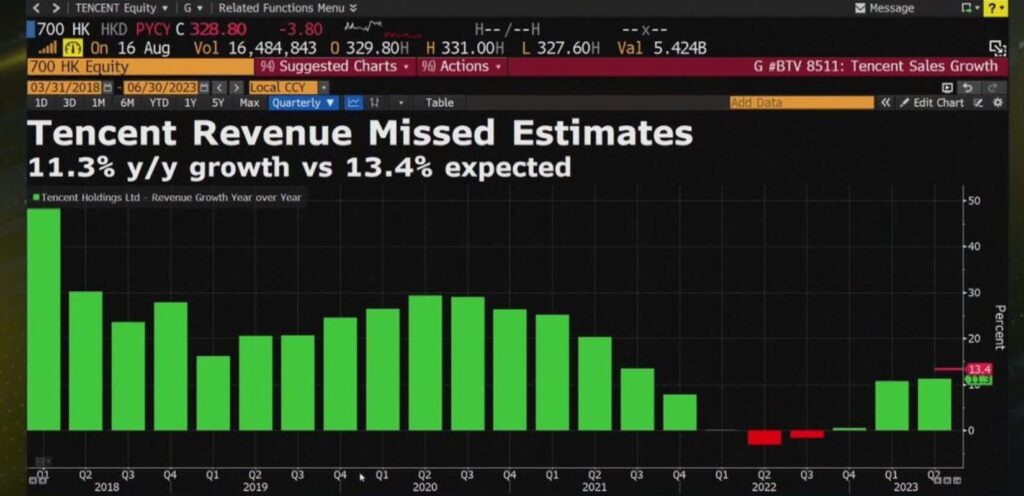Tencent Leads $80 Billion Rout as China Rekindles Crackdown Fear

I am a law graduate from NLU Lucknow. I have a flair for creative writing and hence in my free time work as a freelance content writer.

I am a law graduate from NLU Lucknow. I have a flair for creative writing and hence in my free time work as a freelance content writer.
As a struggling economy hampered Tencent Holdings’ recuperation from the year’s record-breaking fall, revenue growth was lower than anticipated in the second quarter. Tencent Holdings is a Chinese social networking and gaming behemoth.

The expansion of Tencent’s primary gaming division was less robust than anticipated in the January through June period. With fluctuations in currencies removed, domestic gaming income remained stable at 31.8 billion yuan whereas overseas revenue from gaming increased 12 per cent to 12.7 billion yuan.
James Mitchell, the business’s chief strategy officer, explained why the business decided to momentarily launch less socially impacting material in its second fiscal quarter as the cause of the video game industry’s poor growth during a conference call with investors.
The owner of the WeChat texting network and the biggest video gaming firm in the world, according to industry observers, is now facing intense rivalry from its rivals. According to an analyst at Blue Lotus Capital Advisors, Shawn Yang, although Tencent’s fresh releases are up against fierce competition from other game developers like NetEase Inc. as well as miHoYo, its older blockbuster titles have provided subpar revenues owing to a lack of material.
In the three months ending June 30, profit increased 11 per cent to 149.20 billion yuan which is approx $20.45 billion, falling short of the 151.73 billion yuan mean forecast of 21 analysts surveyed by Refinitiv. Little altered from the 10.7 per cent increase in the first quarter, the rise in revenue was stable.
Due to Beijing’s regulatory repression on the internet industry, Tencent reported its very first sales fall during the same period last year, which resulted in a decrease of one per cent in revenue.
Also Read: X to Get Rid of Ability to Block Accounts, Owner Elon Musk Says
For China’s internet behemoths, like Tencent, regulatory anxiety has decreased this year as a result of Chinese officials’ desire to increase private sector trust. However, the world’s second-biggest economy has not grown since late last year, when COVID-19 limits were eased. In comparison to the same time in the previous year, net profit increased 41 per cent to 26.17 billion yuan. However, it was below the average expert expectation of 33.41 billion yuan.
One of the positive aspects was the income that came from web advertisements. As demand for its clip-sharing service similar to TikTok, Video Accounts expanded, jumped 34 per cent to 25 billion yuan. According to the firm, growth in both offline as well as online payment operations was the reason for the fifteen per cent rise in earnings from financial technology and business offerings to 48.6 billion yuan.

I am a student pursuing my bachelor’s in information technology. I have a interest in writing so, I am working a freelance content writer because I enjoy writing. I also write poetries. I believe in the quote by anne frank “paper has more patience than person
One of the top games in the world, PUBG, has been pulled out from its homeland China, following the new rules the China government introduced last month for the video games. Though it will no longer be available for the Chinese consumers, the company is providing them with less-popular, but a politically acceptable option, i.e. Heping Jingying or Elite Force for Peace.

The company had to take the decision as the new rules from the government was restricting the company from securing the license for the game, that would allow it to collect the revenue from it. In fact, after a month-long freeze on approvals, the Chinese government restricted the title from making any money ever in the country. Until now, the company was running the game under testing, but finally, it has pulled out the plug for the game as it failed to monetize the game in the Chinese market.
Tencent brought the title Elite Force for Peace as soon as it circulated a message about it ending the testing period for PUBG on Wednesday. The title belongs to the same Hunger Games-style genre and resembles the widely-famous PUBG. The game is a tribute to the Chinese military and the Chinese Air Force. In fact, the company developed the game by taking advice from the recruitment department of the Chinese military.
The game has been developed by the similar Korea-based publishers as of PUBG, ie. Krafton (earlier known as BlueHole). Including the graphics of the game, there are a few other similarities to PUBG, except its missions targets on vanishing the terrorists in the game. Many of the players have also claimed that their achievements and the progress in PUBG has even transferred to the Peace game.
The game allows the players to add money to their accounts, enabling Tencent to monetise the game. PUBG had to suffer financially due to the Chinese license freeze last year, and this is the time for the company to buckle up to get back on the track. Force for Peace is a game which can be played by the players of age above 16 and is only available for the android users only.

Yashica is a Software Engineer turned Content Writer, who loves to write on social causes and expertise in writing technical stuff. She loves to watch movies and explore new places. She believes that you need to live once before you die. So experimenting with her life and career choices, she is trying to live her life to the fullest.
There have been rounds of rumours for quite some time now, that the multi-player battle online game PlayerUnknown’s Battlegrounds (PUBG), will be banned soon in various countries due to the extra engagement of children on the game. But there had been no confirmation on the same ever, from any of the governments.

But now there is bad news for the Chinese young video game players, as Tencent has imposed a digital lock on the games like Honour of Kings and PUBG Mobile, for the children of age below 13. The children of the same age group, now, will have to ask their guardians to open the lock in order to play the game.
The Chinese gaming giant Tencent announced the new curbs for the underage video-game players, following the Chinese internet governance requirements, to restrain the gaming addiction in youth. The company had already imposed the screen time limit and other rules in order to restrict children from spending more time on games. Now, Tencent plans to double down the rules in order to prevent minors from accessing some of its games in China, to prohibit things like violence, information about gambling or pornography, national politics, or another damaging behaviour for the minors.
The digital lock will be based on facial recognition and player ID checks, such that it will identify the age of the player and restrict the access. The company has set up the barriers, as the Chinese governments have raised concerns about addiction and myopia in children. The government is also worried about the worsening sightedness and poor optical heath among minors, due to their indulgence in long-hour gaming habits.
For now, the digital lock will only work in 12 cities in China. The cross-platform game PUBG has been most criticised for the increased addiction among the video game players. The game is one of the fastest growing video game that is available to play on PCs, Xbox, as well as smartphones. PUBG hosts 100 players during a single game in real-time, which has been the biggest factor in the popularity of the game.
Last year, too, the Chinese Government had imposed a nine-month freeze on new video games for the same reasons, that ended in December, itself.

Yashica is a Software Engineer turned Content Writer, who loves to write on social causes and expertise in writing technical stuff. She loves to watch movies and explore new places. She believes that you need to live once before you die. So experimenting with her life and career choices, she is trying to live her life to the fullest.
The invention of social media platforms has brought the whole world closer. It has connected millions of people around the globe. The genius minds behind the development of such software and applications, deserve success and they have achieved it. From Facebook, Instagram, Twitter, in the US, to QQ in China, all the social media platforms are receiving a whacking response. Chinese internet entrepreneur, Ma Huateng, founded Tencent, which is the biggest internet firms in China, making him the richest man in China.
Early Life
Ma Huateng was born on 29th October 1971, in Dongfang, Hainan, China. His family moved to Shenzhen, near Hong Kong, as his father was a port manager, in Shenzhen. He enrolled at Shenzhen University, in 1989, to study software engineering, and graduated in 1993, with a Bachelor of Science in Computer Science.
Early Career
After graduating, Ma took a job, as a software developer, with China Motion Telecom Development and developed software for pagers. In that job, he made around $176 per month. In his next job, Ma worked in the research and development department, for internet calling services, in Shenzhen Runxun Communications.
Founding Tencent
In 1998, Ma along with his four classmates founded Tencent. Ma had participated in a presentation, for ICQ, which was the world’s first internet instant messaging service, started by an Israeli company. In February 1999, Tencent launched its first ever product. The product was a similar version of ICQ, but with Chinese interface, and was named OICQ (where O stands for Open). This software received a huge response, and it gained more than a million registered users, just in the first year of its launch. OICQ, soon, became one of the largest internet instant messaging services, in China.
The early days of Tencent were hard and full of struggle, for all the four co-founders. In the beginning, the company was funded through the money they earned in the share market. The first few years proved to be crucial for the survival, and Ma took various roles, from janitor to website designer, in the company, during that time. Tencent’s initial services included e-mail and internet paging services.
After the launch of OICQ, there were several controversies, and Tencent also faced a lawsuit from America Online (AOL). After acquiring ICQ, AOL filed a lawsuit against Tencent, in the United States, and claimed that OICQ’s domain names OICQ.com and OICQ.net, violated ICQ’s intellectual property rights. Tencent loss the lawsuit, and also suffered heavy costs. They had to shut down both the websites. Soon, Ma changed the name of the software to QQ and decided to expand his business horizon.
Tencent became the largest instant messaging service, in China by 2004 and also launched an online gaming platform, which attracted more than a million online gaming people. The company also launched WeChat, in 2015, after they conducted a competition between two teams of engineers. WeChat is one of the largest instant messaging apps, used all over the world. Ma also plans to launch an internet hospital that will provide long-distance diagnosis and medicine delivery services to the needy.
Personal Life
Ma Huateng is also popularly known by his nickname Pony. The name is derived from the English translation of his family name, which translates to ‘horse’. He serves in the 12th National People’s Congress and is a great supporter of the Government. He believes in: “Ideas are not important in China – execution is.” He was awarded Innovative CEO of the Year, in 2015. He owns a palatial residence in Hong Kong and also supports charity.

Harshal Pawar is an avid reader, a TV show addict, and a writer. He has a personal blog brainwork.wordpress.com where he jots down his articles and poetry about love and life.
He is currently pursuing film-making and wishes to bring the words written on a paper to the screen. More of all he is a scorpio.